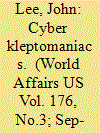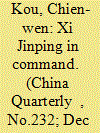| Srl | Item |
| 1 |
ID:
125219


|
|
|
|
|
| Publication |
2013.
|
| Summary/Abstract |
When President Obama expressed "serious concern" about the cyber espionage being conducted against America by its "enemies" in his February 12th State of the Union message, he did not name names. But the statement came just two days after leaks from a US national intelligence estimate identified China as the most serious culprit. In recent months, the administration has been more direct. During his summit with China's new President Xi Jinping in California in early June, Obama elevated commercial cyber espionage to one of the two leading issues (a nuclear-armed North Korea being the other) that divide the two countries. Secretary of Defense Chuck Hagel had struck a similar chord a few days earlier at his opening address at the Shangri-La Dialogue meeting of defense ministers in Singapore, when he referred bluntly to the Chinese state and military entities that are stealing commercial secrets from American firms in cyberspace. And, in a speech to the Asia Society in New York in March, outgoing national security adviser Thomas Donilon said that cyber espionage by state-based or state-funded entities is now at the "forefront" of American-Chinese relations, adding that "US businesses are increasingly speaking out about their serious concerns about sophisticated, targeted theft of confidential business information and proprietary technologies through cyber intrusions emanating from China on an unprecedented scale."
|
|
|
|
|
|
|
|
|
|
|
|
|
|
|
|
| 2 |
ID:
172744


|
|
|
| 3 |
ID:
130262


|
|
|
|
|
| Publication |
2013.
|
| Summary/Abstract |
As President Obama enters his second term, continuing to shift U.S. attention and resources to the Asia-Pacific will be a leading U.S. foreign policy priority. While many in the region have welcomed this renewed commitment, the U.S. "pivot" to Asia has created heightened concerns in China about U.S. intentions.1 U.S. efforts to expand its military force posture in Asia, to strengthen security ties with allies and partners, and to enhance the role of regional institutions are viewed by many in Beijing as directly aimed at constraining China's rise and as the principal cause of regional instability as well as the deterioration of China's strategic environment.
|
|
|
|
|
|
|
|
|
|
|
|
|
|
|
|
| 4 |
ID:
156602


|
|
|
|
|
| Summary/Abstract |
The PLA has been a key player in Chinese elite politics since 1949. However, a series of developments over the last four years has prompted China watchers to re-evaluate Party–military relations. This paper argues that CCP–PLA relations in the Xi Jinping era are characterized by the centralization of power in a single civilian individual. This centralization is reflected by events such as a new emphasis on the CMC chairman responsibility system, the establishment of new coordination bodies under the top leader, radical reforms to the military command structure, the promotion of Xi's public image as the top leader, and large-scale personnel reshuffes during which Xi's trustees have gradually come to occupy key military posts while his rivals have been removed. For Xi, these measures are an antidote to the principal–agent problem in CCP–PLA relations caused by both information asymmetry and the discrepant interests of civilian leaders and the top brass of the PLA.
|
|
|
|
|
|
|
|
|
|
|
|
|
|
|
|